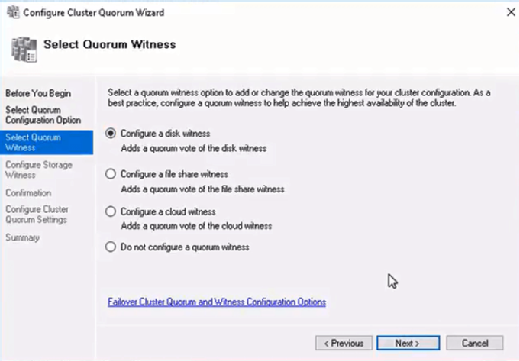Microsoft Cloud Witness
What is a Microsoft Cloud Witness?
Microsoft Cloud Witness is a quorum witness for Windows Server Failover Clustering (WSFC) that uses Microsoft Azure as the arbitration point. It provides a way to maintain a high-availability quorum in a cluster, even in scenarios where the nodes cannot communicate with each other.
How does Microsoft Cloud Witness differ from traditional failover clusters?
In a traditional failover cluster, the nodes use a shared storage resource to maintain quorum. But in a cloud-based scenario, this may not be possible or practical. Microsoft Cloud Witness allows a failover cluster to use a cloud-based storage resource (in this case, Microsoft Azure) to maintain quorum.
With Microsoft Cloud Witness, the cluster nodes write a vote to the Azure storage account. If the cluster loses communication between the nodes, the remaining node(s) can retrieve the current cluster configuration from the Azure storage account and continue to function as a cluster.
This ensures that the cluster remains highly available even in the event of a node or network failure.

What type of organization is a good fit for Microsoft Cloud Witness?
Microsoft Cloud Witness is appropriate for organizations that use WSFC to achieve high availability for their critical workloads and want to take advantage of the benefits of cloud-based quorum arbitration.
Specifically, Microsoft Cloud Witness is a good option for the following types of organizations:
- Organizations with WSFC deployments in Azure. Microsoft Cloud Witness is specifically designed for Azure and is an ideal solution for businesses that already have WSFC deployments in Azure and want to eliminate the need for dedicated quorum servers or shared storage.
- Organizations that want to eliminate on-premises infrastructure. By using Microsoft Cloud Witness, organizations can eliminate the need for on-premises quorum servers or shared storage, which can be costly to deploy and maintain.
- Organizations that want a highly available and scalable quorum arbitration solution. Microsoft Cloud Witness is highly available and scalable, providing businesses with a reliable quorum arbitration solution that can scale up or down based on their needs.
- Organizations that want a simple and easy-to-deploy solution. Microsoft Cloud Witness is relatively easy to set up and configure, making it an attractive option for businesses that want to quickly implement a highly available and reliable clustering environment.
How can a business get started with Microsoft Cloud Witness?
To implement Microsoft Cloud Witness, a business must have an Azure subscription and an existing Windows Server Failover Cluster deployment in Azure.
The high-level steps to set up Microsoft Cloud Witness are the following:
- Create an Azure storage account. The first step is to create an Azure storage account that will be used as the quorum witness for the WSFC cluster. You can create an Azure storage account using the Azure portal or PowerShell.
- Configure the WSFC cluster. Once the Azure storage account has been created, the WSFC cluster can be configured to use Microsoft Cloud Witness as the quorum witness. This can be done using Microsoft Failover Cluster Manager (MSFCM) or PowerShell.
- Grant access to the Azure storage account. To allow the WSFC cluster to access the Azure storage account, an Azure AD service principal must be created with access granted to the storage account. This can be done using the Azure portal or PowerShell.
- Verify the configuration. After the configuration is complete, the WSFC cluster using Microsoft Cloud Witness as the quorum witness can be verified using MSFCM or PowerShell.
Once Microsoft Cloud Witness is configured, the WSFC cluster will maintain quorum even in scenarios where the nodes cannot communicate with each other, ensuring high availability for critical workloads.
It is important to note that the above steps are high level. There may be additional configuration steps required depending on specific deployment scenarios.
Microsoft provides detailed documentation on how to set up Microsoft Cloud Witness. It is recommended to review the documentation thoroughly before proceeding with the configuration.
Learn failover cluster quorum considerations for Windows admins.







